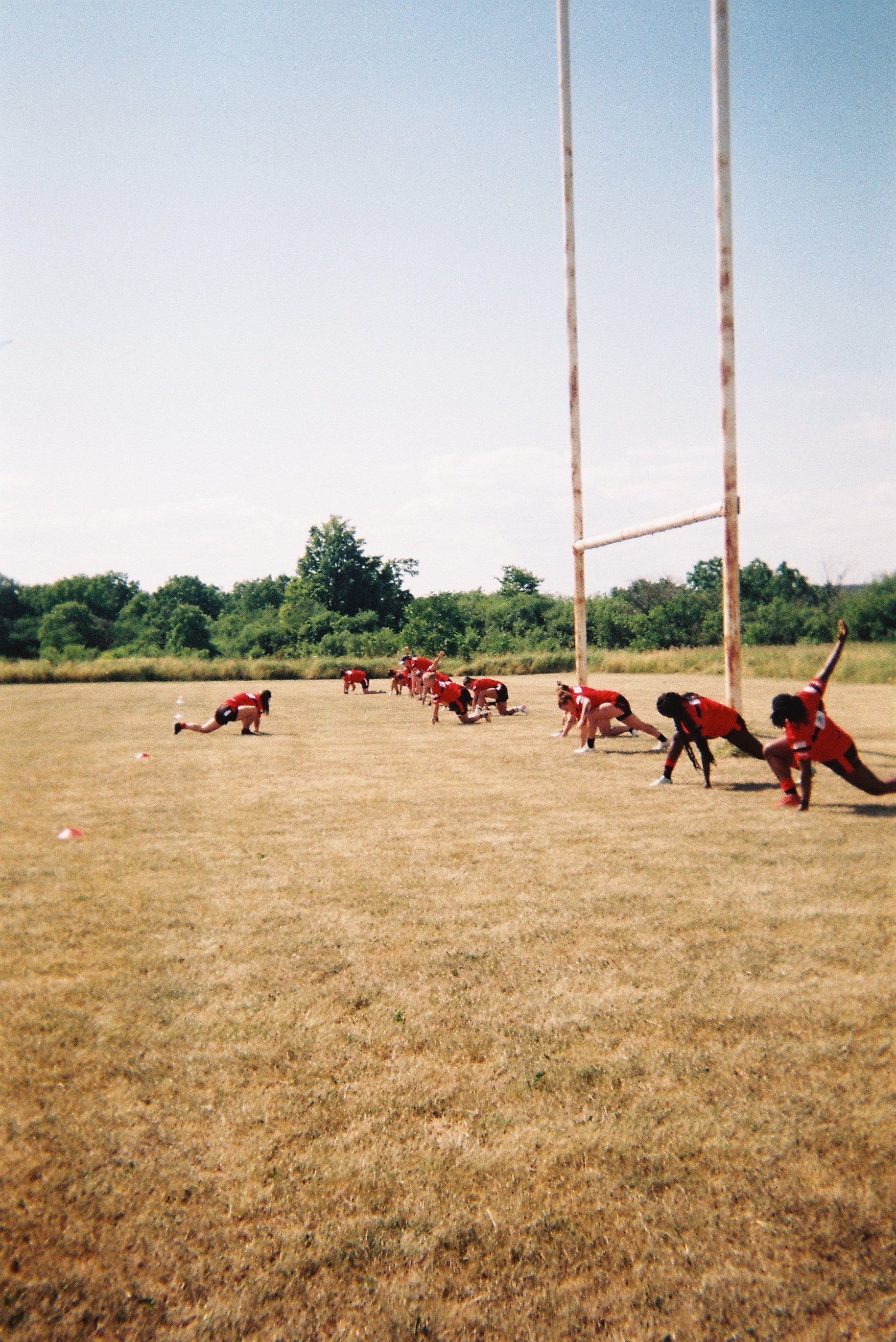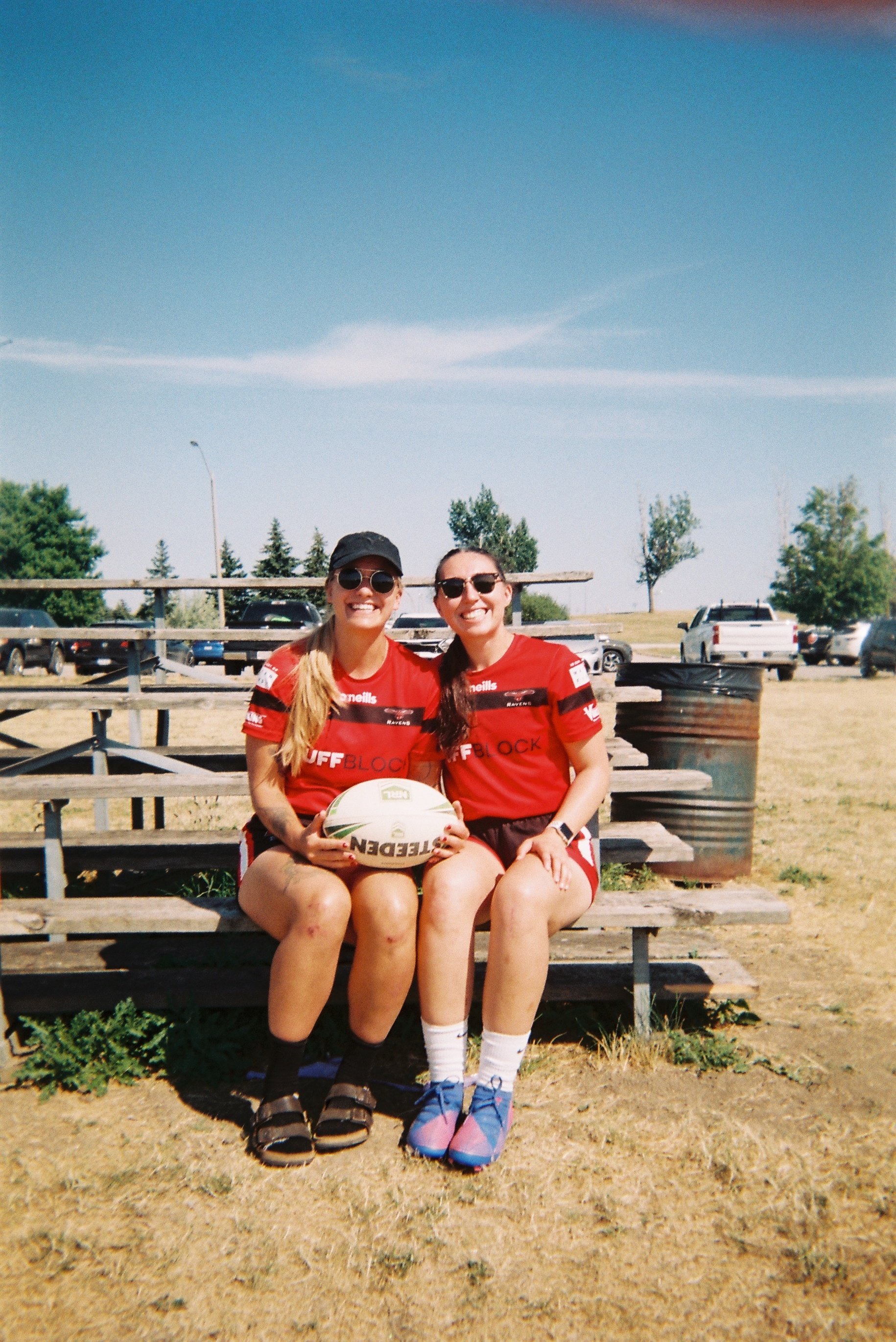Rise Of The Ravens
Gabrielle Hindley, Canada
We teamed up with Rugby League World Cup 2021 for a special series. From Jamaica, Brazil and Lebanon, to England, New Zealand and the Cook Islands, our series documents the personal journeys of players to the Rugby League World Cup 2021 – across the Men’s, Women’s, and Wheelchair tournaments.
Biologist in the week, rugby player on the weekend. Canada Women’s player Gabrielle Hindley tells us about balancing trips to remote locations for work with maintaining her match fitness and growing the sport in Canada.
Can you introduce yourself and tell us about your current rugby life?
My name is Gabrielle Hindley. I am originally from Guelph, Ontario, but have been living in British Columbia (BC) for the past 12 years. I play for the Vancouver Dragons rugby league club and am also the captain of the women's Burnaby Lake Rugby team (playing rugby union). Last year we won the first division women's competition in BC, beating the team that was undefeated all season.
I am a biologist with an engineering and environmental consulting company. Balancing work and rugby can be challenging and definitely requires a lot of time management. I find it most challenging in the summers when I am also completing most of my field work. Field work typically requires longer days and working in remote areas – and hiking to survey locations. This means I have to really prioritize my time off in the summer to coincide with as many rugby games and tournaments as I can. Working remotely also means I do not always have access to my normal training facilities (a gym and grass fields). This means I have to be creative with my training programs to ensure I can maintain fitness and skills through the field season.
That being said, my colleagues have always been supportive of my rugby ambitions. It is important to find a good work-life balance where you can pursue your career goals and personal goals to really be able to live a fulfilling and rewarding life.
What has been your rugby journey up until now?
I started playing rugby at 15, when the high school I attended started their first ever rugby union team. We were all new to the sport.
At university I played for the UBC Thunderbirds which competed in the Canada Interuniversity Sport (CIS) league and competed on the university 7s team at several tournaments. In 2012, I played 7s for Canada at the FISU tournament in Brive-de-Galliarde France.
I started playing rugby league in 2019. I first tried league at a 9s tournament in BC, where most people were new to the sport. I then competed in a BC v Alberta game, again just figuring out the differences in union and league. But I was quickly hooked on the faster pace of league.
I joined the Ravens tour to Serbia in 2019 and made my international debut, before I had an opportunity to play in North Sydney with the North Sydney Bears, which saw me move to Australia. Unfortunately, my stay in Australia and goals for rugby league there were cut short with the pandemic in 2020. However, I have been playing league as much as possible since then.
What did you try to show with the photos? Was there any wider meaning with any of the photos?
The photos span the summer of 2022 and include shots of the BC 9s tournament, the Ravens training camp in July in Brampton, and a training session held in BC for the women’s rugby league skills sessions. The players are from all levels, ranging from Canada Ravens players who will be competing at the upcoming World Cup to people who were completely new to rugby league in grassroots programs, which are building the rugby league community.
I wanted to show the comradery there is within the sport. At the BC 9s tournament that kicked off the summer season we had two women’s teams represented – the Vancouver Dragons and the Valley Warriors. While we have distinct clubs, we are very collaborative. To improve skills and knowledge across the division we ran combined sessions once a week as well as the club sessions.
Are there any good stories connected with the people you photographed?
Rachel Choboter and I took a selfie soon after the official announcement of the Canadian Ravens team. We had just finished practice for the evening. Rachel and I have only been teammates at Burnaby Lake for one year; however, we share a number of commonalities. We are both alumni of the UBC Varsity Women's Rugby program. We also happen to work for the same company, WSP Golder. Rachel is a recent convert to rugby league from union and I am so proud of how much she has accomplished so far! I am so excited to have her as my teammate at the Rugby League World Cup.
What does rugby league and playing for your country mean to you? What are your ambitions for the future?
Rugby league captured my attention because of the speed of the game and the hard work. My greatest asset has always been my work rate and I am always amazed and humbled at how challenging the game can be physically and mentally.
Rugby in general has been a large part of my life. I have always loved that it is a sport that requires a diversity of skills and abilities on a team. I also love that it is a true sport team that requires everyone working as a cohesive unit for the team to be successful.
Playing for my country is an opportunity I have always dreamed about. To be able to compete at the highest level on the international stage is an amazing test of your own skill. I am proud to be able to represent Canada. Playing rugby league when it is still in its initial development in Canada gives me an opportunity to see the sport grow but also to be an ambassador of the sport and help develop it further.
In the future, I have always wanted to see how far sport could take me and whether there is an opportunity to play at a professional or semi-professional level.
What role does rugby league play in your community and country?
Rugby league in Canada is still in its early development. Union is the much more popular code in Canada, but in BC we have been working on building the sport. Currently, there is a competitive men’s league in BC. In 2021 we had the first trial for women's teams to encourage women to come out and try rugby league.
While it is still a developing sport, I am always encouraged by the number of women who come to try league and really enjoy it. Hopefully we will see rugby league grow as a sport in the country and develop the grassroots teams and youth leagues that really turn the sport into a community.
What are the biggest changes happening at the moment in women's rugby league?
The biggest change in women's rugby league is the continued expansion of the NRLW in Australia. With more teams playing at a higher level this pushes the level of competition further. I think the other major change is the increase of international players in the NRLW, giving opportunities to individuals from other countries to compete at that level and hopefully take that back to their home teams.
It will be interesting to see whether other countries can maintain pace. Australia already has a well-developed system for rugby league from minis all the way up to professional athletes. This is something we can all strive to create. There is a lot of emphasis and effort put into the grassroots levels, which are required to be able to have a professional or elite division.
I also think the Rugby League World Cup’s initiative for equal compensation among teams in all divisions - women, wheelchair, and men - is a huge step forward bringing to light the inequity in professional sport.
What are the opportunities for female players in your country?
Rugby league is mostly concentrated in three provinces in Canada: BC, Alberta, and Ontario. In BC, the rugby league season is scheduled in the spring and summer to occur outside the rugby union season.
Typically, the season kicks off with a 9s tournament in late spring. This started as a 'learn to play rugby league' for the women's side but now we have two teams that compete - the Vancouver Dragons and the Valley Warriors.
In past years, we have had provincial competitions of BC versus Alberta. In 2020, the first East vs West game was played in Toronto. The second East vs West game was played in September 2022 in BC.
While the sport is still developing, the opportunity for rapid development of individuals interested in playing at higher competitive levels exists. We have amazing coaches who have worked to grow the sport to where it is today and athletes who have represented Canada at the 2017 World Cup to learn from. It is an amazing opportunity to get involved in a sport from its inception.
What do you expect to change after the RLWC for women's rugby league? What would you like to change?
I would love to see increased development of the rugby league teams in BC and across Canada. I would hope that representation at the international level may bring greater light to rugby league as a sport and generate interest in athletes across the country. I would love to see the momentum from the World Cup carry forward to next year's provincial competitions and see a greater turnout of women so we can have more competitive games.
I would like to see initiatives that try to reach a broader audience. In many cases, most of the rugby league athletes in Canada are converts from rugby union and still play both codes. I would love to see us trying to engage with more individuals from other sports and the general public who may be interested in rugby league, as well as greater development of rugby league for youth. Engaging interest and developing skills early certainly translates into the growth of a sport.
Do you have a message for the next generation of young female players?
You should never be afraid to chase big dreams, but always remember where you came from and what drives you. Never forget your joy of the game and why you play.












